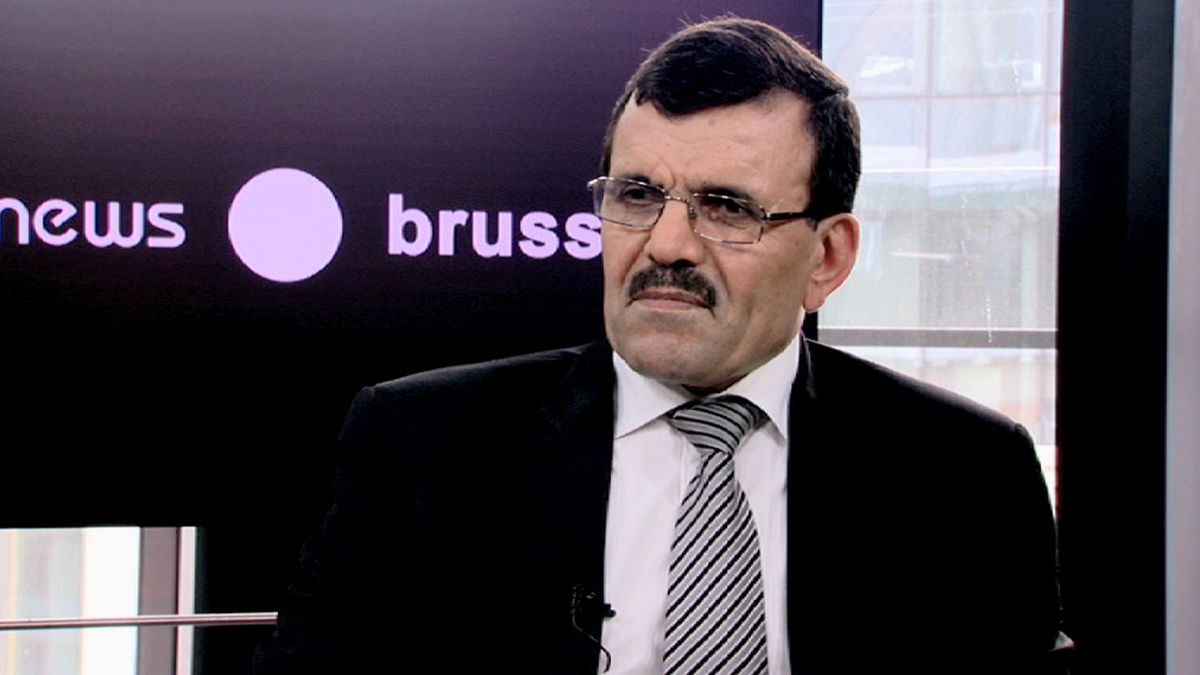Ali Larayedh, the head of the Tunisian government, was in Brussels on June 25, to see the European Commission and Council presidents, as well as the president of the European Parliament, and also with our Brussels correspondent Charles Salamé.
Charles Salamé, euronews: “Prime Minister, following your invitation to Brussels by the European Union, after your various meetings here, can you bring us up to date on the latest developments?”
Ali Larayedh, Prime Minister of Tunisia: “I came to Brussels to talk with European officials, and to inform them, at their request, about Tunisia’s accomplishments in building a democratic state of prosperity and constitutionality, of orderly security in the wake of the Tunisian revolution, which was the first in the Arab World and which so far has been the most successful. European officials wanted to know the dates for the next elections, and we’ve told them that our government would like the elections to be at least partially organised before the end of this year, and followed up in January 2014. That is the basis on which we are working, and we’ve been moving steadily in that direction at a good pace till now.
“We have committed to reforms for which the results may be expected to become apparent within two to three years, possibly even sooner. These purposeful reforms have been in the areas of investment, public-private partnership, the revision of how the state is involved and the collection of taxes. We have found that the economy is improving, since in 2012 we registered 3.6 percent growth, and we hope to attain four percent for 2013, even though we acknowledge that the state of the world’s economy generally is not helpful in realising high rates of growth.”
euronews: “Looking at the state of the Arab World, Tunisia used to be the seat of the Arab League; given what has been happening, notably in Syria, what is Tunisia’s official position towards the events in Syria, especially since jihadist fighters are known to have gone from Tunisia to fight in Syria?”
Larayedh: “Tunisia and the Tunisians approve of, support and strongly encourage any effort towards a political solution in Syria which could speed the end of the violence there – the loss of lives, avoiding more losses and destruction. As concerns the few Tunisians seeking adventure by going to Syria without knowing what is waiting for them there, an ignorance which is to the benefit of those against whom they fight, we have found that this phenomenon – which is not limited to Tunisia – and the government has taken steps to ban young Tunisians from travelling to Syria, so that they do not get sucked into a commitment there, and we are preparing for the consequences of those who are already there and who leave Syria… for this we are working with the parties concerned so as to manage the interests of Tunisian adventurers in Syria; we are taking the necessary measures, which will be applied after their return.”
euronews: “Prime Minister, governments don’t customarily get mixed up in the work of judges, but in your capacity as head of the government of Tunisia, what can you tell us about the investigation into the assassination of the lawyer who was leader of the Popular Front, Chokri Belaid?”
Larayedh: “The case of the assassination of the late lawyer Chokri Belaid – well, immediately following the regrettable murder, a great many security schemes were put in place, because this assassination was simultaneously an attack against the family of Chokri Belaid, against the Tunisian people and Tunisia itself, as well as against the Tunisian political process. However, until now, certain people are being sought, who could furnish us with specifics about this crime, and they are still at large. They could answer certain questions as to who was behind this crime.
“That’s the first thing. Apart from that, the case of Belaid’s assassination has been exploited intensely not to get at the truth but for political ends, and to attack parties or individuals. Several things were brought about which turned out to be proven in error, and afterwards no one made any apology. We heard a lot of things, several analyses. And then when people discovered things that were inexact, no one said sorry.
“Because of this, I am really concerned that this case has been used to stir up affairs in general, or to influence public opinion, or to affect negatively this person or that person, or has been used for political ends. At a government level, we are working seriously, and we are doing everything we can to put our expertise to work to find out who attacked Tunisia, its revolution and the democratic transition process.”
euronews: “Mr Larayedh, the press in Tunisia currently has freedom of expression, and this freedom is one of the biggest accomplishments of the revolution in Tunisia. And yet today the European Commission’s President Barroso has asked you to improve this freedom of expression in Tunisia. There have been requests concerning the judgement of the young activists from the organisation Femen.”
Larayedh: “After the revolution, Tunisia’s justice system became independent. In Europe, when there is a ruling by a justice system, people with political responsibilities refuse comment on the work of the judges. As far as we are concerned, we are going to follow the same procedure.”
euronews: “To conclude, if elections were held in Tunisia today, do you think the Ennahda party would win?”
Larayedh: “I think I still know more than anyone in Tunisia about the Ennahda party, which is among the biggest parties that will be running in the next elections; but as for how many votes it will get – it’s too early to say; that’s hard to predict.”
euronews: “Won’t the elections be influenced by waves of radical religious extremists and jihadists?”
Larayedh: “There are parties and individuals who can create disturbances, as is the case now. They can distort the process but they can’t stop it.”
